She brought women’s soccer to Palestine. Now Honey Thaljieh is advancing equity in sports on a global pitch.
This is where it began.
This patch of cracked cement strewn with broken glass and gravel, ringed with a beaten-up chain-link fence that can barely contain the errant soccer balls. “It’s the same. Nothing has changed,” says Honey Thaljieh, sweeping her gaze over the lot where she and a handful of young women played soccer more than two decades ago as students at Bethlehem University in the West Bank, the occupied Palestinian territory.
On an overcast day in April, a group of young boys, their shoes crunching over the debris, kick a ball into the goal. Thaljieh remembers how bad it hurt to fall on the unforgiving surface. Still, it’s like home, she says. She tells the boys a photographer will be taking photos of the makeshift pitch. “It’s not a pitch; it’s a prison,” a short 9-year-old named Mohammed answers back. Honey breaks out in her trademark gusty laugh. Prison. She has used that same word to describe her own obstacles: Her gender was a prison, her nationality, the social restrictions of Arab society, war, all of it.
But prison or not, for Honey Thaljieh, this patch of ground was a launchpad.

Honey Thaljieh’s path to a career at FIFA began at a run-down lot where she played soccer more than two decades ago as a student at Bethlehem University.
Image credit: Samar Hazboun
Young and determined
Thaljieh grew up in a tiny one-bedroom apartment in Bethlehem’s old city, a street away from the Church of the Nativity, which is built over the grotto where tradition holds Jesus was born.
The third of five children in a Palestinian Christian family of modest means, Thaljieh had little to do at home. In the conservative Palestinian society of the 1980s and early 1990s, girls were discouraged from playing outside. She was stir-crazy. “I used to come back from school and watch the boys playing football,” Thaljieh says, sitting on a heavily stuffed old-fashioned sofa in the family’s living room, where her soccer trophies still decorate the shelves. She’s here for the Easter holiday, visiting from Zurich, where she works at the headquarters of FIFA, the international soccer governing body, and where she’s a member of the Rotary Club of Zurich Circle International.
Here at home, the memories are everywhere, especially of the pull of soccer and of her intuition, already as a kid, that the game could deliver at least a sense of freedom. One day, as a 7-year-old Thaljieh passed the boys, the ball happened to roll in her direction. She started skillfully imitating the dribbling and kicking that she’d seen players do at the World Cup on her family’s black-and-white TV. The boys were shocked. As in many parts of the world, soccer was a male-only domain in Palestinian society. “But when they started to see how good I was with the ball, they started to fight over me and which team I should belong to,” she says. So Thaljieh began joining them, kicking a ball made of wadded-up newspaper around the impossibly narrow alleyways outside her home, often in her bare feet.


Honey Thaljieh talks with her mother, Naheda Thaljieh, and flips through a family album during a visit home to Bethlehem from Zurich, where she works at the headquarters of FIFA, the international soccer governing body. Image credit: Samar Hazboun
Less impressed was her father, who did not want his daughter playing outside with the boys and definitely not playing soccer. When he returned from a long day of work, he would scold her and force her inside. “I would cry and cry, and then the next day, repeat. Every day, same story. I didn’t give up. He gave up!” she says.
Now 70 years old, Micheal Thaljieh looks sheepish when asked about his opposition. Sitting behind the counter of his modest shop near Manger Square where he sells dish-washing liquid and cold drinks alongside Palestinian olive oil and soap, he does his best to explain. “You know, it was Arab society here and it was a little difficult then for a girl to play football, but in the end, she had to play and see her life and the world progress,” he says. The shop is decorated with flags and banknotes from the countries where Thaljieh has played.
“There was no safety, no freedom anywhere. I grew up with these traumas.”
So the determined girl kept playing. She wore shorts, breaking another cultural taboo on the modesty of women’s attire. She’d come home bruised and sometimes bleeding. Her defiant spirit would define her attitude toward future obstacles. And they would be many.
‘No safety, no freedom’
Israel has occupied the West Bank, the larger of the two Palestinian territories (the other is Gaza), since the Arab-Israeli war of 1967. Today, Palestinian cities and villages are hemmed in by a tortured patchwork of Israeli military checkpoints, tall concrete walls and fences, and Israeli settlements, considered by most of the world to be illegal under international law. For the territory’s 3 million Palestinians, trying to get somewhere a short distance away can be a dangerous, hourslong exercise in frustration because of Israeli restrictions on movement throughout the territory.
Multiple uprisings against the occupation have triggered Israeli military crackdowns and years of bloodshed, dashing hopes for Palestinian statehood and independence. “There was no safety, no freedom anywhere,” Thaljieh remembers. “I grew up with these traumas.” During her junior year of high school in 2000, a conflict known as the second intifada, or uprising, broke out. Backed by tanks and helicopters, Israeli forces invaded Palestinian cities and imposed a siege on residents.
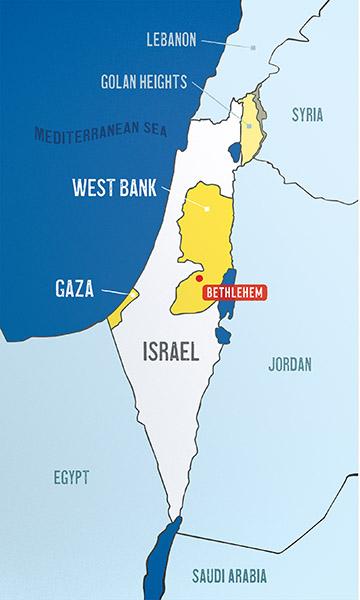
Israel has occupied the West Bank, the larger of the two Palestinian territories (the other is Gaza), since the 1967 Mideast war.
Illustration by Madison Wisse
The fighting lasted for more than four years. In the streets of Bethlehem, gunbattles raged and, in one of the most dramatic moments of the conflict, a group of Palestinian fighters holed up inside the Church of the Nativity near the Thaljiehs’ home. The Israeli military deployed tanks in Manger Square and snipers took positions around the sixth-century church in a standoff that lasted more than a month. During that time, Thaljieh and her family were forced to stay in their home. “We were only allowed out for short periods to buy food,” she says.
Israeli soldiers raided hundreds of homes, including Thaljieh’s. In the dead of night, her sister shouted for her to get up. Thaljieh remembers thinking she was having a nightmare until the voices of soldiers coming down the hall got louder. They forced the family into the street in a trauma that still sometimes disturbs her sleep.
Amid the turmoil, Thaljieh was trying to complete normal teenage rituals, including preparing for her final high school exams, known as tawjihi, essential for anyone seeking to go on to a university. It’s a nerve-wracking affair in the best of times. The day Thaljieh was to take one of the exams, an Israeli tank crushed the family car that would have gotten her to the testing location. Determined to get there, she flagged down an ambulance and pleaded with the driver, “Please, can you take me?” To her astonishment, as she opened the doors, she discovered other desperate students also hitching a ride to the exam. Despite the odds, Thaljieh finished second in her class and was accepted to Bethlehem University.
Forming a team
Thaljieh started at the university in 2002, as the conflict rolled on, and was restless. “Nobody was playing football because they were scared of the Israeli soldiers,” she says. She saw an advertisement hanging in the cafeteria recruiting young women interested in football. Samar Araj Mousa, the first woman to direct the university’s sports programs, wanted to create a women’s football team.
To see if this new student could really play, she sent Thaljieh to the men’s soccer coach, Raed Ayyad. In an encounter that echoed her first street matches with the boys in her neighborhood, the man with a long beard looked at her and said, “You play football? Take a ball. Show me.”
“I started dribbling,” Thaljieh says, “and then I shot the ball. It hit the fence and burst. He looked at me and said, ‘Now we can start to play football.’”
But a team of one is not a team. Araj Mousa advertised around other schools and at a home for orphans. One young woman was spotted competing in a men’s cycling race and was recruited to join. Thaljieh also tried to persuade women playing on basketball and volleyball teams. But soccer was seen as a man’s sport. “They said, ‘No football, we will become masculine,’” Thaljieh recalls. “And I said, ‘Look at me. Nothing changed!’”
Four young women joined. They trained on the concrete court next to the university and played younger boys’ clubs since there were no other women’s teams. Newspapers and TV stations began telling their story, and soon three more women’s teams were established, in the West Bank cities of Ramallah and Jericho and in Gaza. “Their stories were like mine,” Thaljieh says. “They started in the streets somewhere, or in a refugee camp, or in an orphans village.”
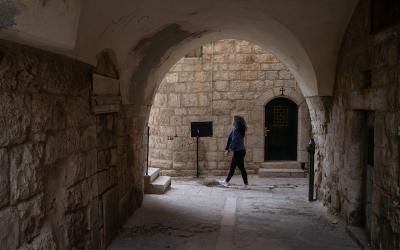
Thaljieh walks the streets in Bethlehem, where she attended university and played soccer, eventually joining an unofficial national women's team.
Image credit: Samar Hazboun
The effort grew into an unofficial national women’s team of more than a dozen players. In 2005, they traveled on a shoestring budget to neighboring Jordan to play in their first tournament with a full 11 players on the field per side. “We lost — epically,” Thaljieh says. And they continued to lose. With no money, no league, little equipment, and inadequate infrastructure, they were the ultimate underdogs.
On top of that, Israeli military checkpoints made it difficult for players from different cities to train together. The women could get held up for hours at checkpoints, sometimes late at night. Even those parents who encouraged their daughters to play worried about their safety on the roads, and players began to leave the team.
The women desperately needed support. To get it, they first needed official recognition from the Palestinian Football Association. Only then could they form a professional league and formally compete at the international level. While finishing her bachelor’s degree, Thaljieh and the team’s backer, Araj Mousa, campaigned for recognition, including lobbying officials and appearing for TV interviews.
Later, Thaljieh even got hold of the phone number of the president of the Palestinian Football Association, Jibril Rajoub, a senior figure in the ruling Fatah party and a former top security official. “He was surprised. He said, ‘How did you get my number?’” Thaljieh recalls. “He’s a very powerful man.” Soon after, they met face-to-face at a men’s match at the Khader stadium near Bethlehem, where she sold him on the idea of a national women’s team. “He was very open-minded to the girls playing football, very encouraging, very supportive,” she says. “So it was like a win-win.”
A career with FIFA
A turning point came in 2008, when FIFA representatives arrived and officially launched a Palestinian women’s league. It was a dream come true: national and international recognition. Within a year, the national team was playing on a full-size turf field in the West Bank in front of thousands of spectators. “When I started in football, no one wanted to recognize girls playing,” Thaljieh says. “So that was the moment that I said, ‘Wow. I made it happen. It worked.’”
Thaljieh captained the team for a total of seven years until injuries forced her from the playing field. She began developing youth sports programs around the West Bank and realizing the impact she and her teammates could have on children there — and around the world — who needed to see someone who looked like them to imagine themselves as champions, as leaders.
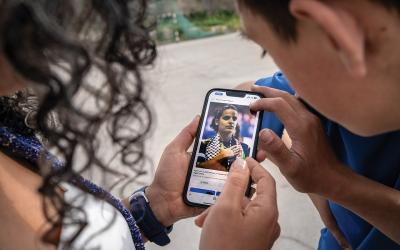
Thaljieh looks through photos of her playing days, which included seven years as captain of the Palestine women’s national team.
Image credit: Samar Hazboun
Thaljieh earned a master’s degree in sports management from the FIFA Master program and in 2012 landed an internship and then a job at the organization’s Zurich headquarters — completing a remarkable rise from Bethlehem’s alleyways to the highest body for soccer in the world. With FIFA, she began working in its women’s football development program, which supports 211 member associations with everything from league development and commercial strategy to leadership and coach mentorship. The role opened her eyes to the fact that women’s fight for equality in athletics, among other arenas, extended far beyond her homeland.
“I came to Europe and I was shocked that women are not represented,” she says. At the time, there were no women on FIFA’s top decision-making body. Women’s teams, banned in many European countries until the 1970s, still lacked resources, adequate facilities and pay, and were subjected to harassment, sexism, and social stigma. In the United States, the four-time World Cup champion women’s national team fought for years to wrest from U.S. Soccer in 2022 a promise to equalize pay with a men’s team that has made it to a World Cup quarterfinal only once since finishing third in the inaugural tournament in 1930.
Today, Thaljieh is FIFA public relations manager with focuses on spreading the message that football is for everyone and using the sport as a platform for social change, diplomacy, and inclusion. Initiatives she’s been part of have included helping female refugees become involved in the sport and running campaigns to end violence against women. One mission she especially cherishes is delivering new soccer cleats to children in refugee camps and poor communities around the world. She knows how it feels; she didn’t get proper playing shoes until she was 21. “I see the happiness on their face,” she says. “I feel it. It gives me goose bumps.”
Around the world there are signs of change, including the appointment of FIFA’s first female secretary general, Fatma Samoura, in 2016. Growth in sponsorships, attendance, and broadcast viewership point to the value of the professional women’s game.
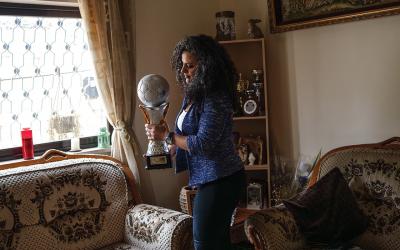
Thaljieh picks up one of the many trophies from her soccer career
Image credit: Samar Hazboun
And Thaljieh uses her platform to push for inclusivity in football and for women’s empowerment, capturing the attention of audiences at TEDx Talks and other high-profile venues. One such talk, at a Rotary club in Zurich, led to an invitation to join the Rotary Club of Zurich Circle International as it was forming in 2020. For the first project she proposed as a member, the club purchased and distributed water fountains to Bethlehem public schools with the help of Rotary members there. The club’s charter president, Hermann W. Delliehausen, says Thaljieh has brought energy to the group and a willingness to do things differently. “When she enters the room everyone is focused on her,” he says. “She’s a very, very, very special person. She’s the sunshine of our club.”
The next generation
As her visit home to Bethlehem nears an end, Thaljieh stops by the Diyar Women’s Football Club that she’s supported for years. Seven teenage girls are passing balls back and forth while their coach watches at the expansive Dar al-Kalima Indoor Sports Hall. Inaugurated in 2014, it’s one of the largest indoor sports venues in the West Bank. The squeak of the girls’ sneakers, the coach’s shouts, and the thud of the balls echo through the high-ceilinged hall.
“I took football as a tool to fight oppression, inequality, injustice.”
Thaljieh walks in, dressed in a knit blue blazer and fitted black jeans with her recognizable curly black mane framing her large eyes and big smile. Thaljieh isn’t tall, but here, too, her presence is clearly felt.
Selina Ghneim, a 15-year-old with a long ponytail, pink shoelaces, and a big sore on her left knee, exchanges looks with her friends. Thaljieh approaches the girl, a member of the Palestine national team for women under 20, and gives her shoulders a squeeze. “Do you know who I am?” she asks playfully.
“Yes,” the teenager says shyly. “You are Honey Thaljieh.”
“What else?”
“You work at FIFA.”
Honey knows who Selina is too. “She made the goal against Jordan,” she says.
The teen smiles softly, looking down, simultaneously proud and starstruck. Ten days earlier the U-20 team won the West Asian Football Federation championship, the first international title for a Palestinian national women’s team.
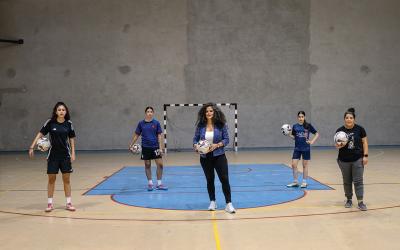
Thaljieh (center) with some of the women and girls of the Diyar Football Club that she supports in Bethlehem.
Image credit: Samar Hazboun
Two women, Maha Araj and Sarab Shaer, have come to the hall to see Thaljieh. Two decades earlier, the three played together on the newly formed team at Bethlehem University and later on the national team. Today Araj is the coach of the Diyar club and Shaer is coaching the club’s under-15 players. Shaer, who was living in a home for orphans when she started playing soccer, credits Thaljieh with changing her life. “She encouraged me to take courses, to develop myself,” she says. “I received a bachelor’s degree in sports management. Without her I would never have made such achievements.”
The women marvel at the indoor training facility. It’s a far cry from their cracked concrete court. From their original group of five players there are today more than 300 girls and women playing in 15 clubs around the West Bank competing locally and internationally. Teams established in Gaza fared far worse under an Israeli blockade of the territory starting in 2007 and the current war. “We don’t even know if any of the girls are still alive,” Thaljieh says.
Adversity is ever present, and looking back Thaljieh doubts she’d be the person she is today without the hardships and without football, which she regards as an instrument of liberation. “I took football as a tool to fight oppression, inequality, injustice, and poverty, to fight for equality, women’s rights, and opportunity. It gave me all the opportunities I needed to bring me where I am today.” Now, in her footsteps, countless others can follow.
This story originally appeared in the September 2025 issue of Rotary magazine.
